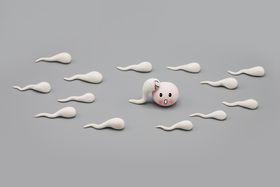There is a widely believed myth that it is the “macho sperm”—that wins the “sperm race”—that gets the chance to fertilise an egg and become a human being. However, the latest study by a group of researchers at Stockholm University and Manchester University NHS Foundation Trust shows that even though the fastest sperms reach the ovum first, it is the egg that has the final say on which sperm fertilises it. Also, a woman’s egg may prefer one man’s sperm over another’s.
Ovum, also known as the egg cell or the female reproductive cell, is the biggest cell in the body. Every woman is born with all eggs already inside her ovaries. During each menstrual cycle, these eggs will be released. The egg cell is not capable of movement, but it can release chemicals called “chemoattractants” that would attract sperms. Follicular fluid surrounding the eggs contains these chemicals.
Chemoattractants would allow the sperm to change their swimming behaviour—sperm would swim straight and move towards the egg when the chemicals communicate the same with them. The new findings say that the egg uses the same chemicals to attract sperm from certain men in a better way.
The researchers came to this conclusion by studying samples of sperm and follicular fluid from six couples who were undergoing fertility treatments. As part of the study, the team exposed the follicular fluids from the women with the sperms of their respective male partners and other men. And they found that the eggs did not always attract more sperm from their respective partner. The researchers observe that “the interactions between egg and sperms depend on the specific identity of the woman and the man involved”. This means that a woman's egg may not always agree with her choice of partner.
Eggs can benefit by picking “high quality” and “genetically compatible” sperms. And, that explains why they are highly picky. It is estimated that only a few hundred sperms make it to the egg, and only 10 per cent of these sperms are capable of fertilising an egg at a given time. The study points out that the chemical incompatibility between sperms and the follicular fluid may be an important factor that blocks pregnancy. The study was published in the journal Proceedings of the Royal Society B.
It is expected that this breakthrough study would help the scientific community understand some of the currently “unexplained” causes of infertility. This, in turn, would help in advancing fertility treatments.


